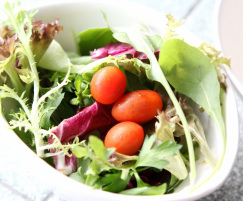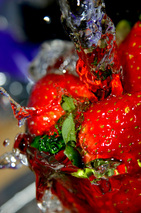 Fruit and vegetables are an essential part of a healthy and well-balanced diet. As our world has become more interconnected, it is easy to get produce grown half a world away, which was once considered exotic in Canada. Pesticides are commonly used in the growth process but they vary depending on the fruit or vegetable and also where the item is grown. As there is no international standard in what is considered acceptable, pesticides also vary in their toxicity depending upon the country of origin. If you don’t feel like eating bug and weed killer along with your apple here’s some information you should know. The Environmental Working Group compiles an annual report in which they compare pesticide contamination in 48 popular fruits and vegetables. They analyze the results of samples taken by the USDA where foods were washed and peeled to mimic consumer practices. It is important to keep in mind that unwashed produce likely has higher concentrations of pesticide residues. The 2014 guide tested 32,000 samples and found that 65% of them contained pesticide residues. The EWG calculates that you can lower your volume of pesticides by 92% if you choose your daily serving of fruits and vegetables from the clean 15 rather than the Dirty Dozen. In other words, choosing a minimum of 5 servings from the Dirty dozen list means you consume an average of 14 different pesticides a day. However, if 5 servings are chosen from the 15 least contaminated list, you consume less than 2 pesticides per day. Foods high in pesticide exposure are better if bought organic, from a local farmer not using pesticides, or grown yourself.
 EWG's Dirty Dozen PlusTM list are the foods that were found to have higher levels of pesticide residues compared to other items and also contained a number of different residues. The Plus category of the Dirty Dozen were foods that were contaminated with toxic insecticides to the human nervous system. These 3 foods are Kale, collard greens and hot peppers. The most notable findings for this list are:
The EWF Clean Fifteen TM are the foods, which had the lowest levels of pesticide residues with large samples containing none. No single item on the Clean Fifteen list tested positive for more than 4 types of pesticides with only 5.5% of the samples having 2 or more pesticides. Avocadoes are the cleanest with only 1% of samples having any pesticide traces found. From the Clean Fifteen the following were found to contain no residues.
The health benefits of fruits and vegetables far outweigh the risk of pesticides in produce. It is important to keep eating them, as they are a rich source of vitamins, minerals and nutrition. Pesticides are of concern as there are serious health risks associated with them. They are designed to be toxic and kill organisms that farmers do not want on their crops. It is no secret that different pesticides affect our health causing hormone disruptions, cancer, brain and nervous system toxicity and skin, eye and lung irritations. The risk is relative when you look at the big picture. Even the foods on the Dirty Dozen list with all their pesticides are far healthier for you than eating highly processed foods or food with excessive sugar. It is important to note that cooking the fruits and vegetables drastically reduces the amount of pesticides. It is important to note that just passing your produce under running water is not enough. The samples were all washed and peeled prior to being analyzed. If you do not wash your fruits or vegetables have you buy them, then you are consuming higher levels of residues. A quick and easy way to clean your fruit and vegetables is to wash them with vinegar. It is believed that vinegar removes excess dirt, bacteria and residual pesticides. Take a large container and add 4 parts water for every 1 part of vinegar. Let your produce soak for at least 20 minutes, then scrub gently and rinse under running water. The shopper's guide is meant to reflect the overall pesticide load of 48 common fruits and vegetables to allow consumers to lower their levels of pesticide contamination. The health benefits of fruits and vegetables are much, much, much greater than the risk of pesticide exposure even if one consumes conventionally grown produce compared to not eating fruits and vegetables! Make sure you clean your produce before eating it. When possible organic is a good option. As well, eating local and in season foods also reduces the need for pesticides and if you have the ability then growing your own produce is an excellent option!
0 Comments
Leave a Reply. |
Harmi KalerDoctor of Naturopathic Medicine in Okotoks and Calgary. Categories
All
Archives
July 2015
|
CLINIC INFORMATION
|
LOCATION
113 - 109 Southbank Blvd
Okotoks AB T1S 0G1 Phone: 403 938 1138 Fax: 403 982 2114 Email: [email protected] |
HOURS
Monday: 10am - 6 pm Tuesday: 10 am - 6 pm Wednesday: 10am - 6 pm Thursday: 10am - 6 pm Friday: 10am - 6 pm Saturday: by appointment only Sunday: Closed Holidays: Closed UPCOMING CLINIC CLOSURES
|
This website is for educational purposes only. The content on this website is not meant to treat, diagnose or prevent any conditions. Always consult with a qualified healthcare provider for your care. The author of this website is not liable for any adverse effects that may occur based on any information obtained from this website.
Copyright ©2013-2023 by Harmony Health Integrative Centre. All Rights Reserved
Copyright ©2013-2023 by Harmony Health Integrative Centre. All Rights Reserved

 RSS Feed
RSS Feed